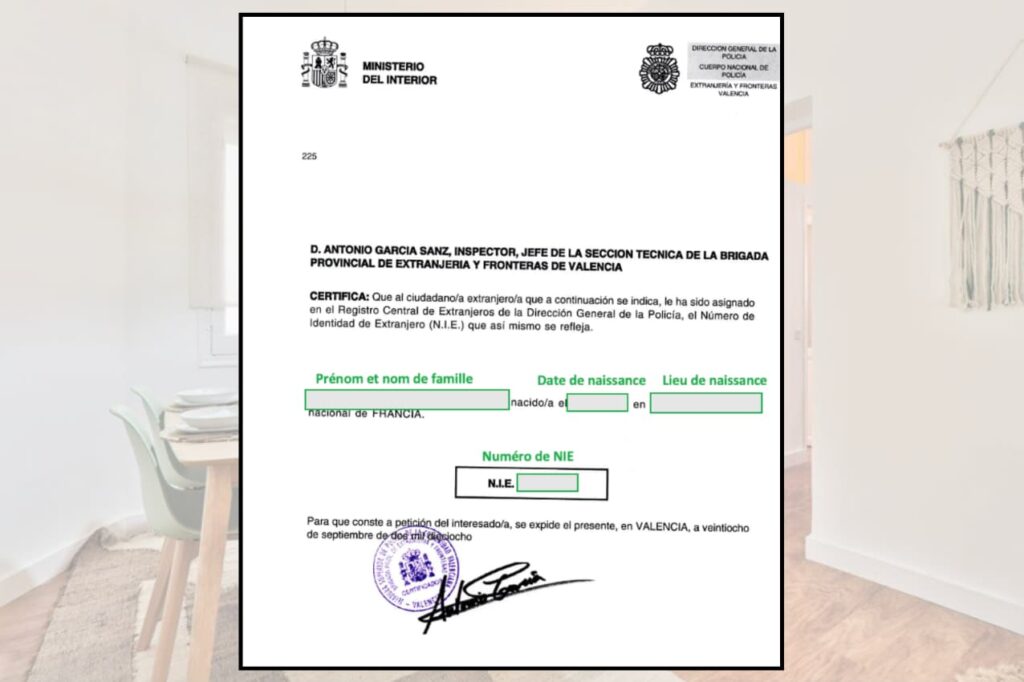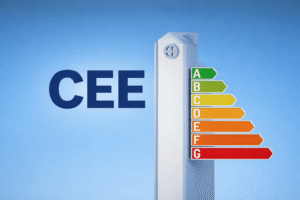What is the NIE?
Foreigner Identification Number
The NIE, or "Número de Identidad de Extranjero," is a personal and unique identification number issued by the General Directorate of Police to each foreigner in Spain.
This number is essential for any interaction with public administrations and for the majority of socio-economic and professional transactions between individuals, including the purchase of real estate.
The NIE format includes an initial letter (X, Y, or Z), followed by seven digits, and ends with a verification letter, for example, Y6671688B.
This number remains valid throughout your life for all activities in Spain. The NIE serves as both physical (NIE) and fiscal (NIF) identification.
Not an Identity Document
It is important to note that the NIE is not an identity document. European citizens must therefore possess, in addition to the NIE, a valid identity document from their country of origin (passport or national identity card).
For a European citizen residing in Spain for less than three months, the national identity card or passport is sufficient.
Buying as a Couple
If you are planning to buy a property as a couple, each person must obtain their own NIE.
In Spain, other identification documents exist, such as the DNI (documento nacional de identidad) for Spanish citizens, the CIF (código de identificación fiscal) for companies and legal entities until 2008, and the NIF (Número de Identificación Fiscal).
Since 2008, the NIF has replaced the CIF for companies, corresponding to the DNI for Spaniards and the NIE for foreigners.
Purchase via a SCI
For the purchase of real estate in Spain via a French SCI, it is necessary to obtain an NIF from the Spanish Tax Agency.
What is the NIE for?
The NIE (Número de Identidad de Extranjero) is a key element for completing a multitude of procedures in Spain, hence the importance of requesting it as soon as possible.
The process of obtaining it can take up to two months.
This number is crucial for several activities, some of which are inaccessible without it. Here are its main uses:
- Housing: For the purchase or sale of real estate, the signing of mortgage loans, the registration of properties, and the management of notarized documents.
- Administration: For census registration, obtaining residence permits, paying property taxes, taxing motorized vehicles, managing capital gains tax, obtaining building permits, civil registration, and accessing the health card.
- Social Security: Necessary to register with social security, request services from the INEM (unemployment management), and transfer unemployment benefits from a member state of the European Economic Area.
- Economic Relations: Essential for managing payrolls, settling national and regional taxes, taxing non-residents, creating companies, corporation tax, VAT, as well as for inheritance and gift taxes.
- Other: Used to open a bank account, enroll minors in school, validate diplomas, buy or transfer a vehicle, obtain a driver's license, and subscribe to services such as electricity, water, telephone, and internet.
Where to obtain your NIE?
Whether you are in Spain or abroad, patience will be your indispensable ally. The application process can vary considerably, ranging from one week to sometimes up to three months.
If you wish to delegate the task of obtaining your NIE to Terreta
If you are abroad or wish to delegate the NIE application, Terreta can handle the entire process of obtaining your NIE for €290 excluding tax.
Everything is managed from start to finish:
- File creation
- Preparing the power of attorney and signing online before a notary
- Follow-up on the application and obtain the NIE
You will receive your NIE in two weeks (on average), without having to go anywhere.
If you are in Spain
To obtain the NIE in Spain, you must apply exclusively to the local National Police Stations.
Appointments are made on the official website administracionespublicas.gob.es, but be warned, getting an appointment can be very complicated!
Steps to make an appointment in provincial capitals:
- Select your region from the dropdown menu « Seleccionnar » of « PROVINCIA DISPONIBLES ».
- Under « TRÁMITES CUERPO NACIONAL DE POLICÍA », choose « POLICIA-CERTIFICADO DE REGISTRO DE CIUDADANO DE LA UE ».
- On the page that opens, click on « Entrar ».
- Select « Pasaporte », enter your passport number, as well as your first and last name.
- Click on « Solicitar Cita ».
The site may indicate that no appointments are available. In this case, follow these tips.
Tip 1: Log in to the site on Monday morning at 8 a.m., when new slots are often released. If necessary, refresh the page every 5 minutes until 9 a.m.
Tip 2: Try a police station in a small town in the same Autonomous Community, where the demand is lower. Arrive early, an hour before opening, and be prepared to return several times if necessary.
Tip 3:Hire a lawyer. Terreta can handle this for you for €290 excluding tax.
Once you have obtained an appointment, fill out the EX-15 forms and the modelo 790 codigo 012 for the fee (€9.84 in 2022). Bring all the required documents on the day, and expect a wait that can last up to 3 hours.
After paying the fee at a bank, return to the police station to collect your NIE.
If you are not in Spain
Apply for the NIE in person at the Spanish consular authorities in your country of residence.
- Make an appointment with the Spanish consulate nearest to you. Each consular site has its own appointment procedure, which may vary.
- For some consulates, such as Paris or Brussels, you can make an appointment online or by telephone. Others, such as Geneva, allow procedures without an appointment.
- Make sure you go to the consulate that corresponds to your place of residence. For example, if you live in Grenoble, you must go to the consulate in Lyon, not the one in Paris.
To facilitate your appointment process for the NIE, here is the information organized and detailed for the main consulates:
- Algiers: click here to visit the website of the Spanish Embassy in Algiers
- Amsterdam: click here to visit the website of the Spanish Embassy in the Netherlands.
- Beirut: embassy located at Palais Chehab, Hadath Antounie. Telephone contact 05 46 41 20 or by e-mail at emb.beirut@maec.es
- Bordeaux: Click on « DEMANDE DE RENDEZ-VOUS » (Link in the middle of the page for Bordeaux)
- Brussels: Make an appointment from 9 a.m. to 1 p.m. Telephone: 02 509 87 72 or by email: cog.bruselas@maec.es
- Budapest: by e-mail: emb.budapest@maec.es; more information on this page.
- Casablanca: Make an appointment by calling 05 22 22 07 52
- Doha, Qatar: more information on this page.
- Geneva: No appointment needed. Hours: 8:15 a.m. to 1 p.m. Address: 53 Avenue Blanc, 2nd floor, 1202 Geneva. Telephone: 0041 (0)22 749 14 60
- Lyon: Go to the bottom of the page and click on "RDV ici" (Link to make an appointment in Lyon).
- Luxembourg: Click here for NIE (Link to NIE appointment booking process in Luxembourg)
- Marseille: Click on "ENLACE//RENDEZ-VOUS" (link in the middle of the page for Marseille)
- Montpellier: Appointments from 9am to 2pm. Phone 04 67 58 20 21 or email cog.montpellier@maec.es
- Paris: Click here for NIE (Link to Paris NIE appointment booking process)
- Strasbourg: Appointments from 9am to 2pm. Phone: 03.88.32.67.27 or email cog.estrasburgo@maec.es
- Toulouse: Click here for NIE (Link to Toulouse NIE process)
Be sure to click on the links provided to directly access the instructions specific to each consulate.
On the day of the appointment, bring the EX15 and 790 forms, a photocopy of your identity card or passport, proof of address, and a stamped envelope for sending the NIE.
Payment of the fee (€9.84) is required, payable by check or in cash.
The NIE processing time ranges from 2 to 4 weeks, delivered by email or post.
Note:If you are abroad and do not wish to manage the NIE application yourself, Terreta can handle this for you for approximately €290 excluding tax per application. This includes a notarized power of attorney issued remotely.
The processing time for receiving the NIE is generally 3 to 4 weeks.
What forms do I need to fill in?
To obtain your NIE, two essential forms must be completed: form EX-15 and form 790. They must be completed in CAPITAL letters, either directly on a computer or manually.
Form EX-15
Download the EX-15 form by clicking here. This document is in Spanish and must be completed in CAPITAL letters and in SPANISH.
To help you, here is a detailed completion guide: Step-by-step guide to completing forms EX-15 and 790-012, along with some additional tips:
- "Nombre" means first name in Spanish, while "apellido" is the family name.
- For the "Sexo" (gender) question: H for homme (hombre) and M for femme (mujer).
- For "Estado Civil" (civil status): S for single (soltero), C for married (casado(a)), V for widowed (viudo(a)), D for divorced (divorciado(a)), Sp for separated (separado(a)).
- Don't forget to enter your e-mail address in the dedicated question.
- Do not fill in parts 2. and 3.
- In section 4.2 "Motivos", tick the appropriate reason - economic, professional or social. For example, for a property purchase, tick "Por intereses económicos" and add "compra de una vivienda en Espana" or specify the city or region.
- Sign in the "Firma del solicitante" box.
Form 790 Código 12
Form 790 is used to pay the fees associated with obtaining the NIE. You can download it here: Tasa modelo 790 Código 012.
Here are the instructions for filling it in (in capital letters):
- NIF/NIE: Identity card number or passport number.
- Apellidos y nombre o razón social: Last name and first name(s).
- Calle/plaza/avda: Type of road (street, square, avenue).
- Nombre de la vía pública: Street name.
- Número: Street number.
- Teléfono: Phone number.
- Municipio: Municipality/city.
- Código postal: Postal code.
- Provincia: Indicate your country of residence (France, Belgium, Switzerland, Luxembourg, etc.).
- Check « Asignación de Número de Identidad de Extranjero (NIE) a instancia del interesado ».







